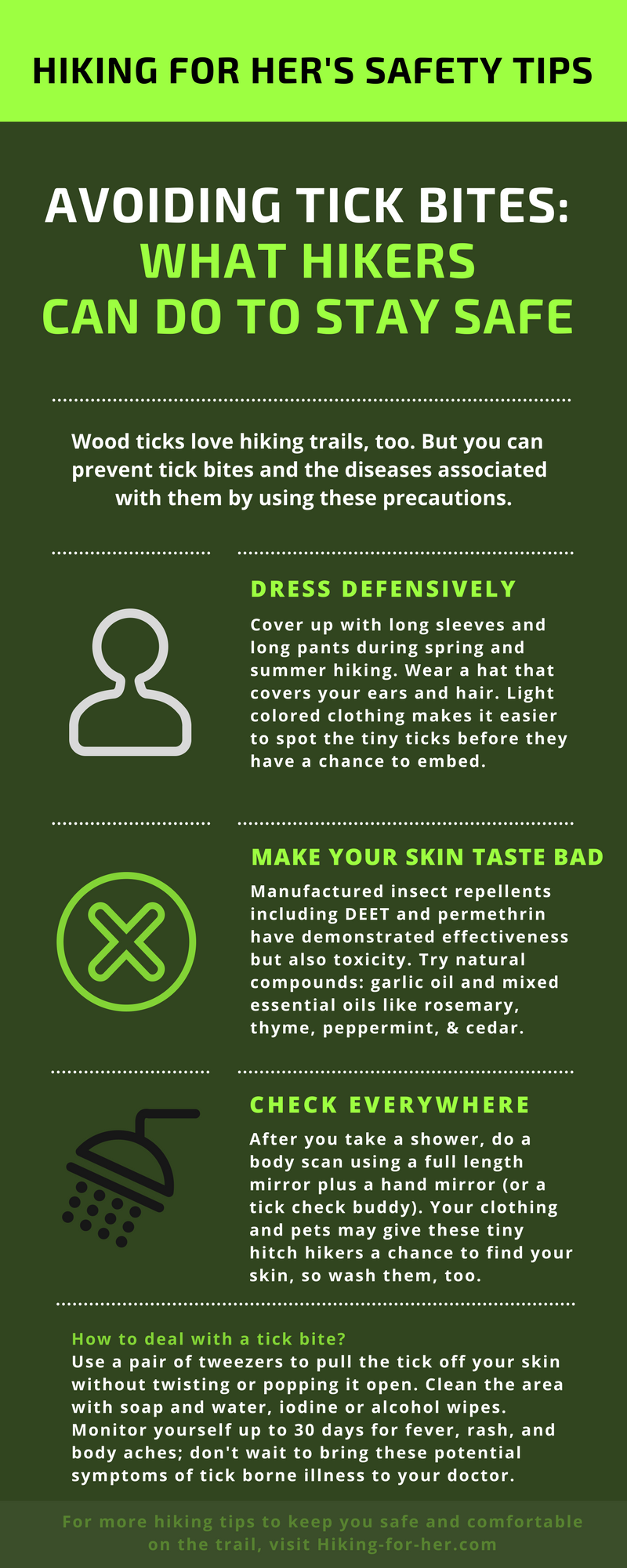Rocky Mt Spotted Fever &
Tick Bites:
What You Should Know
By Diane Spicer
Rocky Mt Spotted Fever isn't just in the Rocky Mountains, so you should glance through this information to see if it's pertinent to the trails you will be on this hiking season.
 Rocky Mt Spotted Fever can occur anywhere there are "wood" ticks.
Rocky Mt Spotted Fever can occur anywhere there are "wood" ticks.There are several types of ticks which transmit this disease to humans.
Unlike Lyme disease carrying ticks, which are very tiny, the dog tick and the wood tick are fairly easy to spot.
And you'll make it even easier by wearing light colored clothing, right?
Right!
How to prevent tick bites and
Rocky Mt Spotted Fever
Rocky Mt Spotted Fever and tick bites go hand in hand, but it's not a chicken-or-egg conundrum.
First the infected tick bites you, then the fever with spots sets in.
So a smart hiker games the system on a hiking trail in her favor by preventing a tick from contacting her bare skin:
- know if your area is a
hot spot for ticks,
- dress defensively in long sleeves, long pants tucked into high socks, and a hat that covers your hair,
- use tick repellents, and
- do a thorough tick check after every hike (with a hand mirror or your significant other to examine your backside).
Here's a quick summary you can use to remind yourself how to stay safe when hiking in spring and early summer months (prime tick season).
What if you have a tick bite?
What to do if you're bitten by a tick?
Don't panic! Not every tick is infected by Rickettsia rickettsii, the bacterial agent of the disease.
Remove the tick safely
Safe removal is the key to preventing large amounts of tick saliva from flowing into your bloodstream.
- Wash the bite area with soap and water, and wash your hands afterwards.
- The tick should be sent in for testing: does it harbor the bacteria responsible for the signs and symptoms of this disease? That's the question you want answered.
Monitor yourself for symptoms
If you are bitten, you should monitor yourself for these things for about 2 weeks:
- lack of appetite,
- fever,
- abdominal distress (nausea, vomiting),
- sore muscles, and
- a headache that just won't quit.
- diarrhea,
- sore joints, and
- a rash (hence, the name of "spotted"). This is not a problem to ignore!
Rocky Mt Spotted Fever and other tick borne illnesses
If you hike in areas where ticks are present from early spring through late summer, it's in your best interest to take precautions.
And if you are bitten by a tick, don't freak out.
Tick borne illness is treatable, and the key is early diagnosis.
Write down the date of the bite, and describe the wood tick's appearance if possible.
Taking a photo - even better. This will help determine the type of wood tick.
If you're not feeling well after a bite, there are blood tests to determine if you're infected with the bacteria which cause Lyme disease, or the bacteria we just discussed.
- Your health care provider will be able to draw your blood and determine the cause of your symptoms.
- It's your responsibility to get to the medical office as soon as symptoms appear.
Ticks creep you out?
Yeah, me too.
Something about their crawly little legs makes the hair on the back of my neck go up.
That's why I recommend that you incorporate these tick awareness habits into your hiking tricks:
- dress defensively,
- scan for the ticks on your clothing as soon as you're off the trail,
- wash your clothing in hot water, and give your canine trail companion(s) a good scrub as well,
- do a full body tick check after your shower,
- hang your backpack outdoors for a few days, and
- monitor your linens and bedding for any ticks which detach.
When you find a tick, encase it in tape and throw it in the garbage can. Be sure the tape is completely sealed, because they can wiggle their way out if there is even a small opening.
Go forth in full tick awareness
Don't let ticks keep you off the trail!
Just be prepared to deal with them, and then relax and enjoy the entire hiking season.
For more safety tips on the trail, hop over here.
Home page > Best Hiking Tips > Rocky Mt Spotted Fever
|
I get emails all the time about what I wear, eat, carry and love to use on the trail. That's
why I provide affiliate links to you: the best gear that I use myself and have seen used by other hikers is instantly
available for your consideration, and the gear company sends a few
pennies per dollar to this reader-supported hiking website. There is no added cost to you! Everyone ends up a winner: Great gear for you, strong gear companies, and more free hiking tips for everyone. Thanks very much for your support. It's warmly and sincerely appreciated. It also helps send these hiking tips to all your virtual trail buddies around the globe. |
 |



